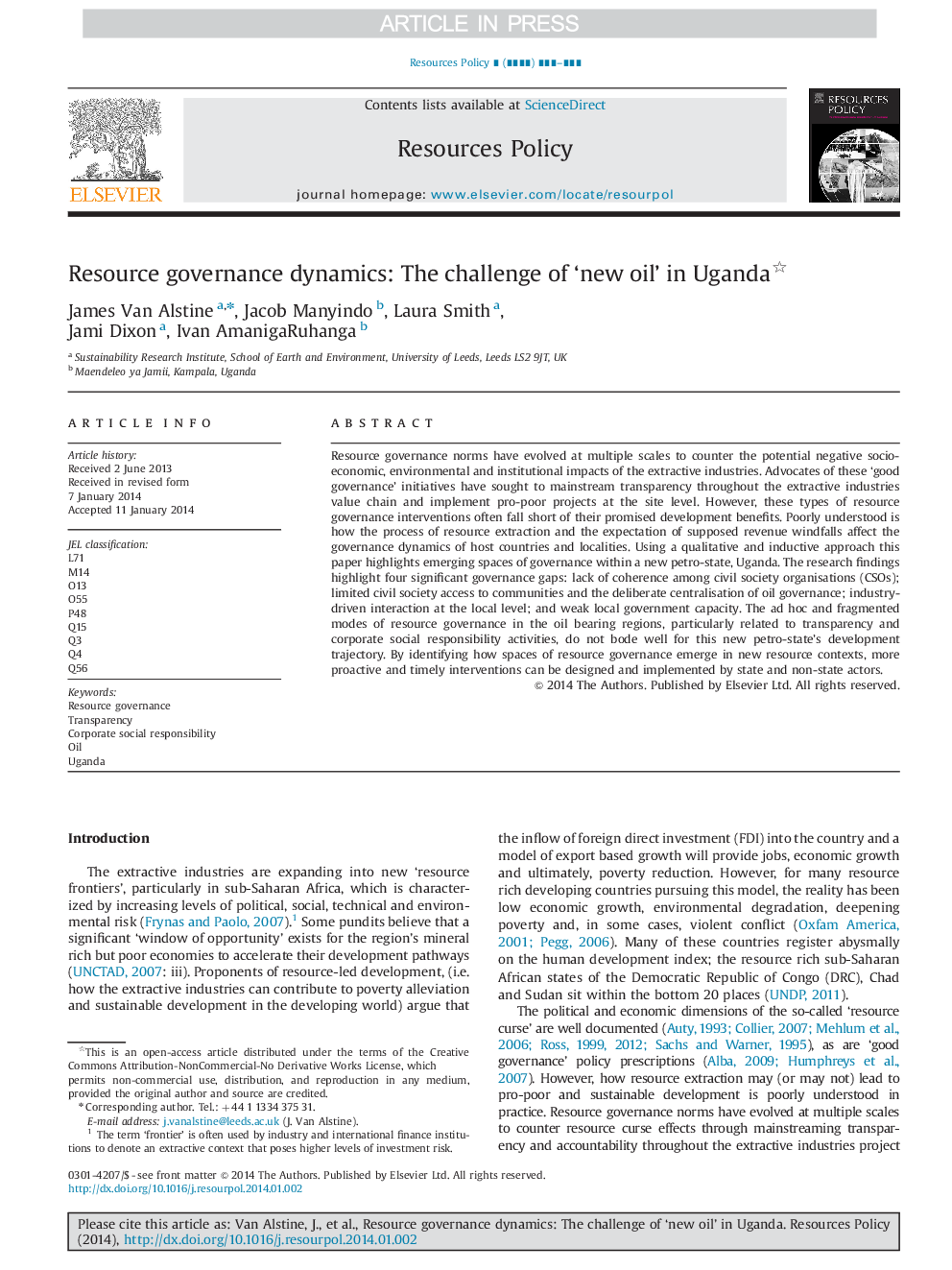| کد مقاله | کد نشریه | سال انتشار | مقاله انگلیسی | نسخه تمام متن |
|---|---|---|---|---|
| 7387905 | 1480762 | 2014 | 11 صفحه PDF | دانلود رایگان |
عنوان انگلیسی مقاله ISI
Resource governance dynamics: The challenge of 'new oil' in Uganda
ترجمه فارسی عنوان
دینامیک مدیریت منابع: چالش "نفت جدید" در اوگاندا
دانلود مقاله + سفارش ترجمه
دانلود مقاله ISI انگلیسی
رایگان برای ایرانیان
کلمات کلیدی
ترجمه چکیده
هنجارهای حاکمیت منابع در مقیاس های چند گانه به منظور مقابله با منافع منفی اجتماعی، اقتصادی، محیطی و سازمانی صنایع استخراجی، تکامل یافته است. مدافعان این ابتکارات "حکومتداری خوب" به دنبال شفافیت در کل زنجیره ارزش صنایع استخراجی و اجرای پروژه های طرفدار فقیر در سطح سایت بوده اند. با این حال، این نوع مداخلات حاکمیت منابع اغلب کوتاهتر از مزایای توسعه وعده خود است. درک نادرست این است که چگونه فرایند استخراج منابع و انتظاراتی از خطرات احتمالی درآمدی بر تغییرات حاکمیت در کشورهای میزبان و محلات تاثیر می گذارد. با استفاده از رویکرد کیفی و استقراضی، این مقاله فضاهای در حال ظهور حکومت را در یک دولت جدید پتروشیمی، اوگاندا، برجسته می کند. یافته های تحقیق، چهار شکاف حاکمیت مهم را برجسته می کند: عدم انسجام در سازمان های جامعه مدنی (سازمان های جامعه مدنی)؛ دسترسی محدود جامعه مدنی به جوامع و تمرکز عمدی اداره نفت؛ تعامل صنعتی در سطح محلی؛ و ضعف ظرفیت دولت محلی. حالت های ویژه و منحصر به فرد مدیریت منابع در مناطق نفت خیز، به ویژه مربوط به شفافیت و فعالیت های مسئولیت اجتماعی شرکت ها، برای این مسیر توسعه جدید نفت پتروشیمی خوب نیست. با شناسایی چگونگی کنترل فضای منابع در زمینه منابع جدید، مداخلات پیشگیرانه و به موقع می توانند توسط بازیگران دولتی و غیر دولتی طراحی و اجرا شوند.
موضوعات مرتبط
مهندسی و علوم پایه
علوم زمین و سیارات
زمین شناسی اقتصادی
چکیده انگلیسی
Resource governance norms have evolved at multiple scales to counter the potential negative socio-economic, environmental and institutional impacts of the extractive industries. Advocates of these 'good governance' initiatives have sought to mainstream transparency throughout the extractive industries value chain and implement pro-poor projects at the site level. However, these types of resource governance interventions often fall short of their promised development benefits. Poorly understood is how the process of resource extraction and the expectation of supposed revenue windfalls affect the governance dynamics of host countries and localities. Using a qualitative and inductive approach this paper highlights emerging spaces of governance within a new petro-state, Uganda. The research findings highlight four significant governance gaps: lack of coherence among civil society organisations (CSOs); limited civil society access to communities and the deliberate centralisation of oil governance; industry-driven interaction at the local level; and weak local government capacity. The ad hoc and fragmented modes of resource governance in the oil bearing regions, particularly related to transparency and corporate social responsibility activities, do not bode well for this new petro-state's development trajectory. By identifying how spaces of resource governance emerge in new resource contexts, more proactive and timely interventions can be designed and implemented by state and non-state actors.
ناشر
Database: Elsevier - ScienceDirect (ساینس دایرکت)
Journal: Resources Policy - Volume 40, June 2014, Pages 48-58
Journal: Resources Policy - Volume 40, June 2014, Pages 48-58
نویسندگان
James Van Alstine, Jacob Manyindo, Laura Smith, Jami Dixon, Ivan AmanigaRuhanga,
